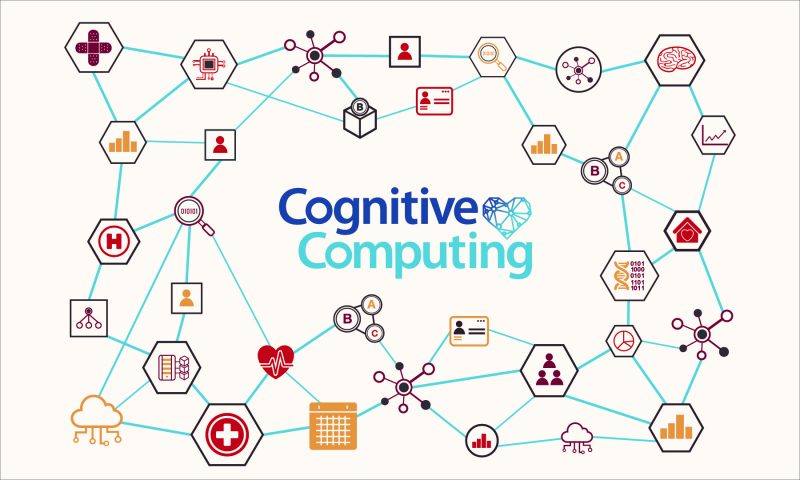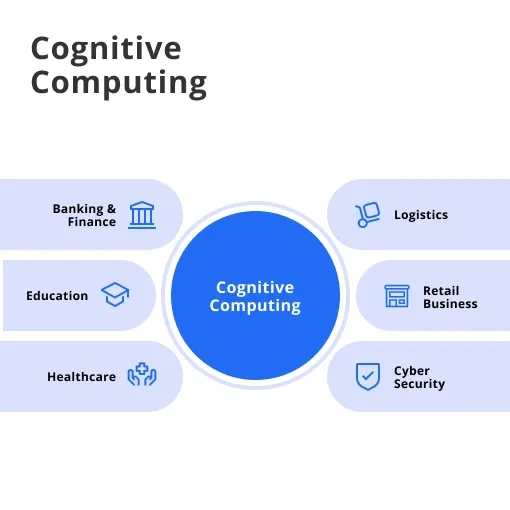What is Cognitive Computing?

Cognitive computing is a branch of artificial intelligence (AI) that focuses on creating systems that can mimic human cognitive processes, including learning, problem-solving, perception, and understanding natural language. It's like giving your computer a dose of brainpower!
Key Components of Cognitive Computing
1. Natural Language Processing
Natural Language Processing (NLP) enables cognitive computing systems to understand, interpret, and generate human language. This includes tasks such as sentiment analysis, language translation, and text summarization, allowing machines to interact with humans in a more natural and intuitive way.
2. Machine Learning
Machine Learning (ML) is a core component of cognitive computing that allows systems to learn from data and improve their performance over time. ML algorithms help computers analyze large amounts of data, identify patterns, and make predictions or decisions without explicit programming.
3. Neural Networks
Neural networks are a type of machine learning model inspired by the structure and function of the human brain. These networks consist of interconnected nodes or neurons that process and transmit information. Neural networks enable cognitive computing systems to recognize patterns, classify data, and make predictions based on previous experiences.
4. Knowledge Representation
Knowledge representation is the method by which a cognitive computing system stores and organizes information. This includes techniques such as ontologies, semantic networks, and databases that enable the system to understand and reason about complex concepts, relationships, and contexts.
Cognitive Computing Vs Traditional Computing
1. Data Processing Approach
Cognitive computing mimics human thought processes, enabling systems to learn, reason, and adapt. Traditional computing relies on pre-programmed instructions and follows a linear approach to process data.
2. Learning Capabilities
Cognitive computing systems can learn from data, improving their understanding and decision-making over time. Traditional computing systems require manual updates and cannot learn autonomously.
3. Handling Ambiguity
Cognitive computing can handle ambiguous or incomplete data by making educated guesses based on context. Traditional computing requires precise, structured data to function effectively.
4. Natural Language Processing
Cognitive computing systems can understand and interpret human language, enabling more intuitive interactions. Traditional computing systems rely on specific commands and syntax for user input.
5. Contextual Understanding
Cognitive computing can understand and analyze context, taking into account factors such as user preferences, emotions, and social cues. Traditional computing lacks the ability to process context.
6. Decision-Making Process
Cognitive computing systems can analyze multiple factors and make informed decisions, even in complex situations. Traditional computing follows a deterministic approach, with decisions based on predefined rules.
7. Adaptability
Cognitive computing systems can adapt to new situations and changing environments, continuously evolving their understanding. Traditional computing systems require manual updates to adapt to new circumstances.
8. Real-World Applications
Cognitive computing is suited for applications such as healthcare, finance, and customer service, where complex decision-making and human-like interactions are crucial. Traditional computing excels in structured tasks, like data storage, calculations, and rule-based operations.
Why is Cognitive Computing Important?
1. Enhanced Decision-Making
Cognitive computing empowers businesses and individuals to make better-informed decisions by analyzing vast amounts of data and providing valuable insights.
2. Improved Customer Experience
By understanding natural language and context, cognitive computing systems can deliver personalized, human-like interactions, leading to higher customer satisfaction.
3. Advanced Data Analysis
Cognitive computing can process unstructured data, such as images, videos, and text, enabling businesses to uncover hidden patterns and trends for strategic decision-making.
4. Automation of Complex Tasks
Cognitive computing can automate tasks that require human-like reasoning and understanding, increasing efficiency and freeing up resources for higher-value activities.
5. Adaptability and Continuous Learning
Cognitive computing systems can adapt to changing environments and learn from new data, ensuring that businesses stay relevant and competitive
When to Use Cognitive Computing?
1. Identifying Appropriate Use Cases for Cognitive Computing
Cognitive computing is ideal for situations that involve large amounts of data, complex decision-making, or the need to understand human language and behavior. Some examples include diagnosing medical conditions, predicting stock market trends, or analyzing customer sentiment.
2. Evaluating the Timing and Feasibility of Cognitive Computing Solutions
It's essential to consider the readiness of your organization and the maturity of available cognitive computing technologies before embarking on a project. Factors like data quality, infrastructure, and expertise can determine the success of your cognitive computing initiatives.
Who Can Benefit from Cognitive Computing?
1. Businesses and Organizations
Companies across various industries can leverage cognitive computing to streamline operations, enhance decision-making, and create more engaging customer experiences. It's like having a secret weapon to outsmart your competition.
2. Researchers and Data Scientists
Cognitive computing can empower researchers and data scientists by providing them with powerful tools to analyze large datasets, identify patterns, and uncover hidden insights. It's like a turbocharger for their analytical prowess.
3. End-Users and Consumers
By making technology more intuitive, cognitive computing can improve the way we interact with devices and services, leading to more personalized and enjoyable experiences. It's like having a helpful companion that understands your needs and preferences.
How does Cognitive Computing Work?
1. Understanding Natural Language Processing (NLP)
Natural language processing is a key component of cognitive computing that enables computers to understand, interpret, and generate human language. It's like teaching your computer to speak your language, so you can have more meaningful conversations.
2. Machine Learning and AI in Cognitive Computing
Machine learning algorithms help cognitive computing systems learn from data and improve their performance over time. It's like giving your computer the ability to grow and adapt, just like a human would.
3. Data Analysis and Pattern Recognition
Cognitive computing systems can analyze vast amounts of data and identify patterns or relationships that may not be apparent to humans. It's like having a super-powered magnifying glass to find hidden clues and connections.
Suggested Reading:
What is Cognitive Search, its Uses and its Workings?
Types of Cognitive Computing Technologies
1. Cognitive Analytics Platforms
Cognitive analytics platforms use advanced algorithms and data processing techniques to analyze large datasets, identify patterns, and generate insights. It's like having a team of data scientists working around the clock to uncover valuable information.
2. Conversational AI and Chatbots
Conversational AI and chatbots leverage natural language processing and machine learning to engage in interactive, human-like conversations. It's like having a friendly, knowledgeable assistant that's always there to help and guide you.
3. Image and Video Recognition Systems
Image and video recognition systems use cognitive computing technologies to analyze and interpret visual content, enabling computers to "see" and understand images and videos. It's like giving your computer a pair of eyes to explore the world.
Cognitive Computing Applications and Use Cases
1. Healthcare and Medical Diagnosis
Cognitive computing can assist healthcare professionals in diagnosing medical conditions, analyzing patient data, and recommending personalized treatment plans. It's like having a brilliant medical expert by your side, helping you make informed decisions for your patients.
2. Finance and Risk Management
In the finance sector, cognitive computing can help analyze market trends, predict fluctuations, and optimize investment strategies. It's like having a financial guru crunching numbers and providing valuable insights to minimize risks and maximize returns.
3. Customer Service and Support
Cognitive computing can enhance customer service and support by powering chatbots, virtual assistants, and other AI-driven tools to deliver personalized, efficient assistance. It's like having a friendly, knowledgeable support team available 24/7 to help your customers.
Suggested Reading:
Cognitive Architecture: Key Concepts and Applications
FAQs
1. What is cognitive computing?
Cognitive computing refers to systems that mimic human thought processes, enabling them to learn, reason, and interact with humans in a natural way.
2. How does cognitive computing differ from traditional computing?
Traditional computing follows pre-defined rules, while cognitive computing systems learn and adapt using data mining, pattern recognition, and natural language processing.
3. What are some applications of cognitive computing?
Cognitive computing can be applied in various fields such as healthcare, finance, customer service, and education to improve decision-making, automate tasks, and enhance user experiences.
4. Can cognitive computing replace human intelligence?
No, cognitive computing is designed to augment human intelligence, not replace it. It helps humans make better decisions by processing and analyzing vast amounts of data.
5. What are some popular cognitive computing platforms?
Popular cognitive computing platforms include IBM Watson, Google DeepMind, and Microsoft Cognitive Services, which offer APIs and tools for developing cognitive applications.
Suggest

